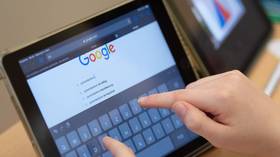Google & Apple set some lucky programmers up for lucrative monopoly with new rules for contact-tracing app

Google and Apple have set out ground rules for public health authorities looking to develop contact-tracing apps on their platform, and the guaranteed monopolies they enable could make some lucky developers very rich.
The tech behemoths unveiled a library of reference code on Monday, along with a list of rules that public-sector partners will have to follow in order to use their proprietary contact-tracing platform, which uses anonymized Bluetooth IDs to alert the user if they’ve come into contact with anyone who has tested positive for the coronavirus. As befits a platform whose privacy safeguards have been hyped to the heavens despite the checkered privacy histories of its creators, the contact-tracing interface will ban apps from using targeted advertising and accessing Location Services, theoretically preventing the tracking of users through space.
Also on rt.com Amazon, Google, and Apple have moved past monopoly status to competing directly with governments… and winningGoogle and Apple will also limit access to their platform to a single app per country - creating a guaranteed (and potentially lucrative) monopoly for whichever lucky developer gets the nod to develop a given country’s app. Their stated aim of picking one app per country (or state - the platform has made allowance for state-by-state differences in policy) is avoiding “fragmentation,” a seemingly logical reason. If hundreds of developers unleash their products on the market at the same time, vetting them for compliance would be all but impossible and delay the roll-out, while governments are clamoring for a standalone version of the platform ready in weeks, not months. Guaranteeing a monopoly on the product may also be a way to soften the blow of banning targeted advertising, typically a huge moneymaker for app developers.
However, the tech giants have already vowed to allow only those apps released by public health authorities to use their platform, and public health authorities aren’t required to turn a profit for shareholders. While the developers those authorities partner with will no doubt be cashing in, they’re unlikely to expect the same level of profits per download as a blockbuster private-sector app. Their payday would come based on the sheer volume of downloads, not high profit margins per user. Google and Apple have pledged to discontinue the platform once the virus has been sufficiently contained - a disturbingly vague endpoint, to be sure, but an endpoint nonetheless, indicating the gravy-train won’t be running forever.
Also on rt.com Contact-tracing app will be ‘key part’ of UK government’s Covid-19 ‘surveillance programme’ – Johnson spokesmanRestricting access to a single app per country also opens the door to the kind of abuse (alleged) monopolies like Apple and Google are intimately familiar with - absent competition, an app developer has no reason to listen to users’ complaints.
While apps using the joint platform are prevented under the new rules from accessing location services, there are loopholes to be exploited - the US has already been using location data from mobile ads to track its citizens for weeks, for example.
Preexisting apps that use targeted advertising or access location services must turn those systems off to access Google and Apple’s platform, but it’s unclear how the tech giants expect to monitor those apps to make sure the offending snoop-ware isn’t switched back on.
Just tested: Apple's Exposure Notification 'Service' is enabled by default in iOS 13.5 beta -- meaning phones will be broadcasting Proximity ID's even without an app installed.Hopefully @Apple will change this to be opt-in in the final iOS 13.5 release?https://t.co/sWLyP6p6t7pic.twitter.com/gYG89Ek7eU
— ashkan soltani (@ashk4n) May 4, 2020
Apps are also required to secure “opt-in” consent before accessing the platform or sharing a positive Covid-19 diagnosis. However, what’s good for the goose is apparently not good for the gander - an eagle-eyed coder perusing Apple’s code found that its “Exposure Notification” service was enabled by default, requiring no opt-in consent from the user.
Apple and Google hope to have the contact-tracing function integrated into their own operating systems within the next few months, meaning users won’t have a choice of whether or not they want the app - it will be integrated into the software that runs their phones by default. If Apple’s sneaky ‘always-on’ notification is any indication, smartphones are about to get a lot more intrusive.
Like this story? Share it with a friend!












